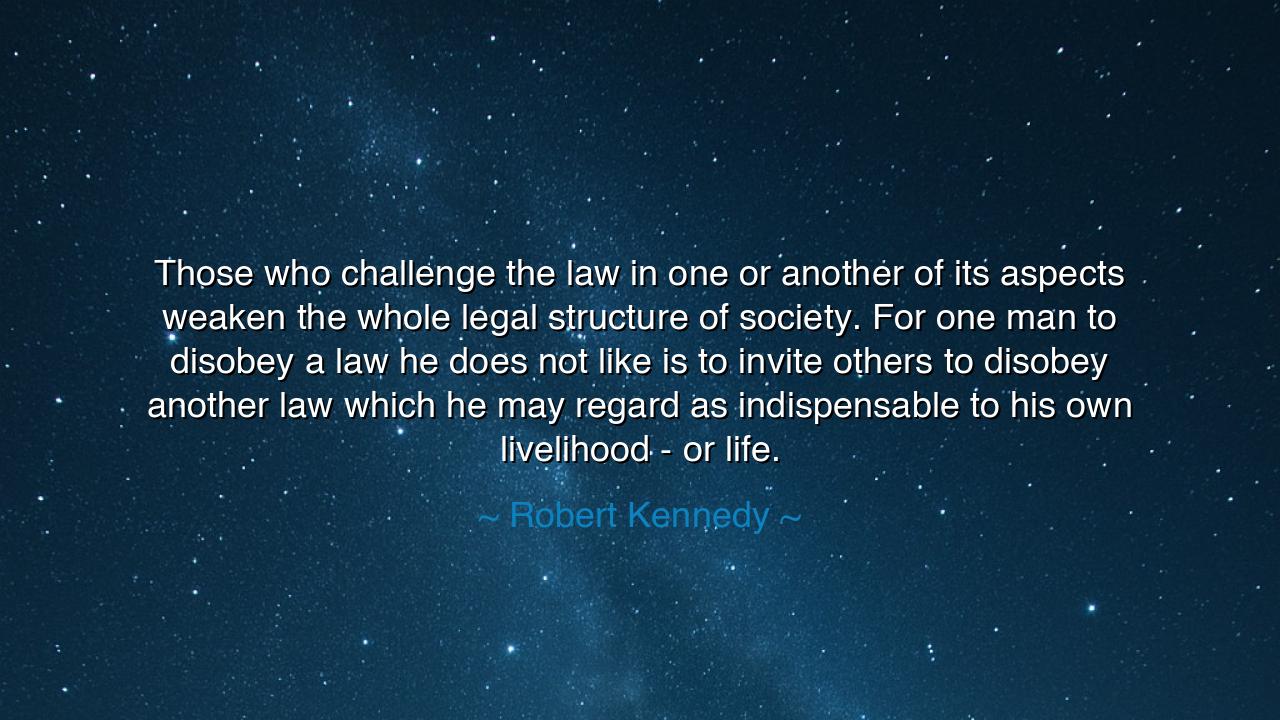
Those who challenge the law in one or another of its aspects
Those who challenge the law in one or another of its aspects weaken the whole legal structure of society. For one man to disobey a law he does not like is to invite others to disobey another law which he may regard as indispensable to his own livelihood - or life.






In the words of Robert Kennedy, “Those who challenge the law in one or another of its aspects weaken the whole legal structure of society. For one man to disobey a law he does not like is to invite others to disobey another law which he may regard as indispensable to his own livelihood—or life.” These words, like the chiseling of stone tablets, bear a truth that echoes across ages: the law is not a mere command but a covenant, a sacred bond between citizen and community. To tear at one thread is to imperil the whole garment, leaving society naked before chaos.
The ancients taught that order is the root of civilization, and law its guardian. When the shepherd ceases to guide his flock, the wolves descend. When the citizen deems himself greater than the law, the city crumbles, not through fire or flood, but through the slow poison of disobedience. Kennedy’s words are a warning: to despise the law that does not suit one’s liking is to invite a world where no law can stand, where the strong bend rules to their will, and the weak suffer without recourse.
Consider the fate of Rome. In her early days, the Twelve Tables gave order to a restless republic. Citizens, rich and poor, found their rights inscribed for all to see. But in her decline, men of power scoffed at the laws, twisting them to favor their ambition. Bribes replaced justice, decrees were ignored, and soldiers became lawmakers with the sword. Rome did not fall in a day; she fell in the slow erosion of respect for her own legal structure, until the great edifice collapsed under its own corruption. Kennedy’s words recall this lesson: disobedience spreads like a contagion, until no stone remains unmoved.
Yet, let us not confuse Kennedy’s teaching with blind servitude. There are times when law itself is corrupted, when its spirit is bent against justice. In such moments, the ancients remind us that true obedience lies not in following tyranny, but in restoring law to its rightful purpose. Socrates, though condemned unjustly, accepted his sentence rather than strike at the authority of the city, showing that even in protest, respect for the whole must guide the actions of the one. His choice was not weakness, but reverence for the principle that law, once destroyed, cannot easily be rebuilt.
A modern tale echoes this wisdom: in the struggle for civil rights, countless men and women marched not to trample the law, but to fulfill its promise. Martin Luther King Jr. spoke of unjust laws that degrade the soul, yet even in defiance, he appealed to higher laws of morality and equality, seeking to heal rather than destroy the structure. This is the balance Kennedy urges us to see: to respect the framework of society, even as we labor to make it more just. To tear it down recklessly is to risk an age of lawlessness, where each man becomes judge, jury, and executioner.
The legal structure is like a temple: each stone depends on the other, and to remove one carelessly is to invite collapse. A man who breaks a law for convenience undermines the foundation upon which his own security rests. For if he scorns the law that guards another’s property, why should another not scorn the law that protects his own life? Thus, the harmony of society is sustained not by fear alone, but by the shared agreement that laws bind us together in mutual protection.
Let this teaching be carried forward: do not despise the law, even when it is inconvenient. Labor instead to reform it with patience, with unity, and with respect for the greater good. For to break it selfishly is to break the trust of the community, and to leave one’s children a world of disorder.
And so the lesson: live as guardians of the covenant. Obey the just laws that preserve harmony; challenge the unjust not with reckless destruction, but with steadfast resolve to restore their rightful balance. In daily life, let each person honor agreements, respect the rules that hold families, workplaces, and nations together. For in these small acts of fidelity lies the strength of civilization. And remember: when one man upholds the law, he protects not only himself, but the very soul of his people.






AAdministratorAdministrator
Welcome, honored guests. Please leave a comment, we will respond soon